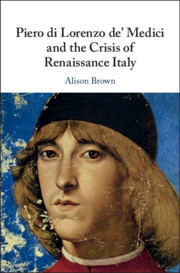Book contents
- Piero di Lorenzo de’ Medici and the Crisis of Renaissance Italy
- Piero di Lorenzo de’ Medici and the Crisis of Renaissance Italy
- Copyright page
- Dedication
- Contents
- Acknowledgements
- List of Abbreviations
- Introduction
- Part I The Early Years
- 1 Piero’s Childhood
- 2 Family Backgrounds
- 3 Education under Poliziano’s Tutelage
- 4 Political Tyro at Home and Abroad, 1484–1486
- 5 Marrying into the Roman Aristocracy, 1487–1488
- 6 The Choice of Hercules
- 7 Piero as Lorenzo’s Deputy in 1490
- Part II Between Republicanism and Princely Rule
- Part III Piero in Power
- Part IV Piero in Exile
- Conclusion
- Bibliography
- Index
3 - Education under Poliziano’s Tutelage
from Part I - The Early Years
Published online by Cambridge University Press: 20 December 2019
- Piero di Lorenzo de’ Medici and the Crisis of Renaissance Italy
- Piero di Lorenzo de’ Medici and the Crisis of Renaissance Italy
- Copyright page
- Dedication
- Contents
- Acknowledgements
- List of Abbreviations
- Introduction
- Part I The Early Years
- 1 Piero’s Childhood
- 2 Family Backgrounds
- 3 Education under Poliziano’s Tutelage
- 4 Political Tyro at Home and Abroad, 1484–1486
- 5 Marrying into the Roman Aristocracy, 1487–1488
- 6 The Choice of Hercules
- 7 Piero as Lorenzo’s Deputy in 1490
- Part II Between Republicanism and Princely Rule
- Part III Piero in Power
- Part IV Piero in Exile
- Conclusion
- Bibliography
- Index
Summary
Piero was only three years old when he was entrusted to the care of Angelo Poliziano in 1475 – two years after Poliziano entered the Medici household – and he remained close to him until Poliziano’s death in 1494.1 The tutor, who became one of Italy’s most outstanding humanists, was a precocious but impecunious youth from the provinces when he first met Lorenzo de’ Medici. He had been sent to Florence to be educated at the university not long after his father’s murder in Montepulciano, when Angelo was ten. Three years after openly asking for Lorenzo’s help in continuing his studies and completing his Latin translation of the second book of Homer’s Iliad in 1470 (which he dedicated to Lorenzo), he was invited to join the Medici household.2 Perhaps Lorenzo already saw Poliziano as a promising, avant-garde teacher for his very young son, as well as a stimulating companion for himself on his trips outside Florence, especially to the Pisan countryside, where he hunted and hawked while working to establish a new university in Pisa. But in promising Lorenzo great success as Piero’s tutor in return for patronage, Poliziano was signing a Faustian pact that may have exaggerated Piero’s achievements and compromised himself.3
- Type
- Chapter
- Information
- Publisher: Cambridge University PressPrint publication year: 2020

